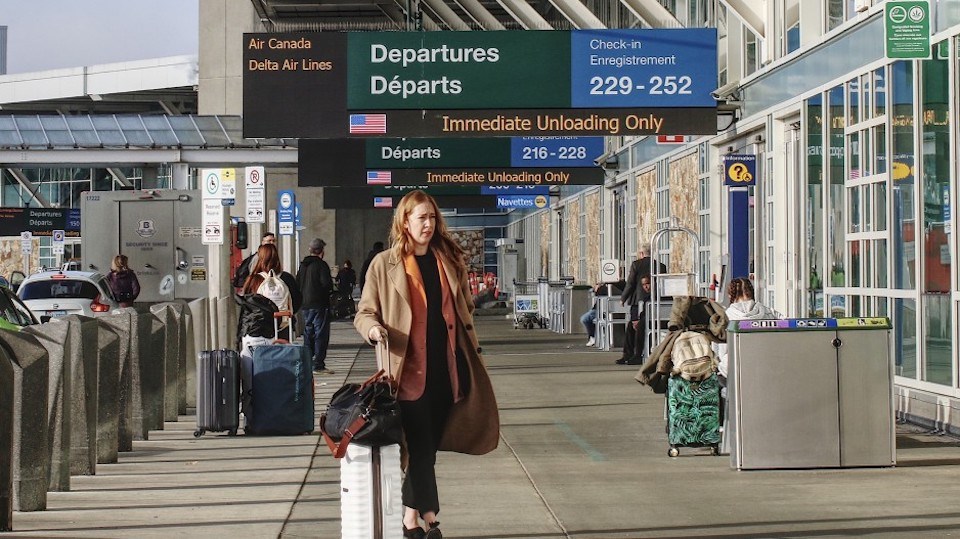The quintessential B.C. business traveller touching down in Toronto for a quick client meeting complete with a car rental and comped hotel room met an abrupt end at the pandemic’s outset.
Even as COVID-19 restrictions have loosened and face-to-face meetings have re-emerged from their Zoom call cocoons, it looks increasingly unlikely that the moneyed-up business traveller will be making a return in force.
But it’s not so much that business travel is dead, according to Tamara Vrooman, CEO of the Vancouver Airport Authority. It’s that it’s still evolving.
“We have seen a bounce-back in business travel, but not quite in the same way,” she said. “So people are not travelling to Toronto for that two-hour business meeting and flying home. They may be going for two or three two-hour business meetings over three or four days. Sometimes they’re taking their family with them and blending leisure and business travel.”
YVR passenger volumes in mid-November sat at 86 per cent compared with where they were at during the same period in 2019.
That’s up from 82 per cent one year ago, and much of that increase is being driven by domestic and American travellers, rather than those from Asia or Europe.
“We’re not seeing a reduction in travel so much as a shift,” Vrooman said.
But this shift in business travel may soon be facing headwinds.
As the summer travel season was gliding into its final stretch this past September, Google set in motion some significant belt-tightening aimed at employees’ business travel.
Media reports at the time revealed the internet giant was limiting travel to what a leaked email described as only “business critical” trips. Now, if an in-person conference has a virtual option, Google employees no longer get permission to fly out and stay at a hotel for the event.
It’s a pattern picking up steam in Canada’s business community, too.
“We have figured out, for instance, in the M&A business we can sell businesses without meeting anybody face to face,” said Brent Holliday, CEO of Garibaldi Capital Advisors Ltd.
His Vancouver firm provides mergers and acquisitions and capital-raising advisory services to tech companies.
Large business conferences remain important to Holliday for networking, “but business meetings, flying to meet your clients or, in my case, the investor or the buyer – completely unnecessary.”
Cissy Pau, principal consultant at Clear HR Consulting Inc., said many employers are trying to get workers back to normal as much as possible after more than two years of workday Zoom calls.
“Networking meetings or conferences are now coming back. People are going out and about, and meeting up with people,” she said. “More employers will be expecting employees to attend those, if that’s part of their job … Whereas back a couple of years, those things were happening virtually or they weren’t happening at all.”
Top of mind for both employees and employers now is inflation, and its effects on commuting and the hybrid work model, according to Pau.
“We’ve had some clients where the employees have literally said, ‘I cannot afford to drive to work. I need to take the bus, or I need someone to carpool with or I need to work from home,’” she said.
Public transit ridership in Metro Vancouver sits at more than 80 per cent of pre-pandemic levels, TransLink CEO Kevin Quinn revealed last month during an address to the Greater Vancouver Board of Trade.
That figure matches the regional transportation authority’s fall target, but it remains unclear how passenger numbers will return to 100 per cent as more people have become accustomed to working from home.
It might eventually come from an external push on the part of employers.
Late last month, Snapchat parent Snap Inc. (NYSE:SNAP) said employees would have to return to the office four days a week beginning in February.
Twitter Inc. CEO Elon Musk also recently mandated all employees must return to the office full time, although Pau said the ongoing upheaval at Twitter under Musk’s watch isn’t necessarily a reliable weathervane for the broader business community.
“The candidate pool is not robust, so then you end up having to accommodate, right?” she said, referring to ongoing labour shortages.
“But I think certainly employers are pushing back. I think it’s just with any kind of trend: There’s the pendulum swing one way, and it has to come back a bit the other way.”



